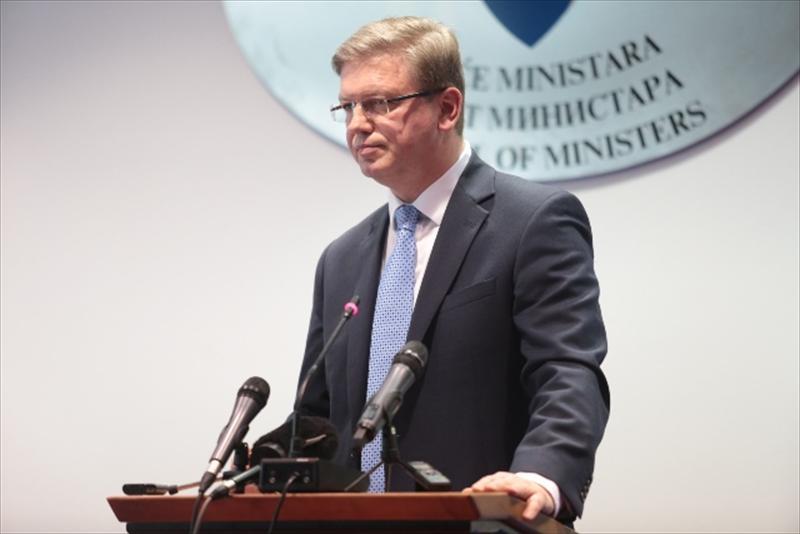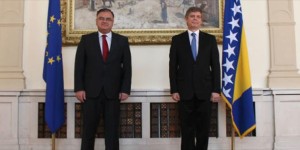Sarajevo, 18 February 2014
Commissioner Füle
“Good morning. Prior to this meeting with Chairman Bevanda and Prime Ministers Niksic and Cvijanovic, I had an extremely constructive and insightful session at the EU Delegation with representatives of civil society organisations, including people who have been participating in the work of ‘plenums’ in Tuzla and Sarajevo. So my first remark is about civil society.
“It is clear that the political system in Bosnia and Herzegovina must become more responsive to the citizens’ agenda – conditions for more jobs, more efficient justice and fair opportunities in life.
“I call on the politicians of Bosnia and Herzegovina not to ignore the voices of the citizens. There is an important space for citizens’ engagement – they should be listened to – they should engage – they should be able to do so free from fear of violence, harassment, or intimidation. Indeed there should be no violence from any side – it is completely unacceptable.
“My second remark: the result of last night’s meeting of the party leaders on implementation of the judgement of the European Court of Human Rights in the ‘Sejdic and Finci’ case was so deeply disappointing.
“Implementation of this judgement is not a remote issue or virtual issue. It is an international obligation of Bosnia and Herzegovina that, following the will of the Member States, is now a key to progress on the EU path. It has real consequences. It means the full entry into force of your Stabilisation and Association Agreement. It means the possibility for Bosnia and Herzegovina to submit a credible application for EU membership. And that inevitably means more reform and improvements in the country and more investments. I want to address this myth that here in Bosnia and Herzegovina we were sort of involved in some kind of virtual issue. No, exactly the opposite – the issue has very clear consequences on the life of each and every citizen of Bosnia and Herzegovina.
“Do not forget that since 2010, three formal initiatives had been tried, via the Bosnia and Herzegovina institutions, to resolve this matter. They had not met with success. It was right that we tried to resolve it, working with the political leaders, because we could leave no possible method aside.
“Throughout the process and again last night I saw some participants making their best efforts and I saw some others talking but still not making a sincere effort. I have therefore concluded my efforts on this issue, and I informed political leaders subsequently, and I will report this, actually I have already reported this to the High Representative/Vice President Catherine Ashton, and through her also to the Foreign Affairs Council. Next week I will personally report it to the Secretary General of the Council of Europe. Now it is time again for the institutions of Bosnia and Herzegovina to take it forward.
“Bosnia and Herzegovina will remain, at least for the time being, in breach of its international commitments. It is a shame for the politicians, through inaction, to fail – because the rest of the region is moving forward towards the European Union, and because citizens are calling politicians to be accountable.
“My third remark is to underline that this is not the end of our engagement with Bosnia and Herzegovina and its citizens, I underlined that to the civil society representatives this morning. Just now with Chairman Bevanda and the two Prime Ministers, I briefed them on the three new initiatives for the benefit of the country, for the benefit of the citizens of Bosnia and Herzegovina.
“First, in the whole region, as we announced last October when we published the Enlargement Strategy, the European Commission is putting a focus on better economic governance. I will launch this in London next Monday and Bosnia and Herzegovina will be one of the first countries to benefit from this new approach.
“We will assist Bosnia and Herzegovina to prepare a National Economic Reform Programme. That will push forward reforms and actions to tackle this country’s dysfunctional labour market, get better co-ordination on economic and fiscal policies and create a better environment for business.
“With the same aim, we will also propose a Competitiveness and Growth Programme to push forward the sectoral reforms – in, for example transport, telecoms and energy – that will enhance BiH’s competitiveness, unlock investments, growth – and employment, which has a very special role in this new approach. The programme’s implementation will also benefit from present and future IPA assistance. So this new IPA, with new money, will be connected with the priorities of this programme to address economic and social challenges in your country.
“Secondly, in that context, I proposed the formation of a joint EU-BiH working group to accelerate the implementation of EU funded projects in your country. We have 210 million Euro of projects on-going and we have almost 150 million Euro of projects which are yet to start, which are not yet contracted or programmed and we have to speed up these projects and we need to make sure that they address concerns in the economic and social areas.
“There should be very clear social and economic benefits produced for communities. More support for small and medium enterprises, more social inclusion programmes, faster processing of cases in courts, and more efficient use of taxpayers’ money.
“And third and finally, we proposed to expand the Structured Dialogue on Justice to start also to tackle some of the elements – important for Bosnia and Herzegovina – of Chapter 23 of the EU acquis. Let me recall that Chapter 23 deals with the fundamental freedoms and judiciary, and particularly what we have in mind is the fight on anti-corruption. We intend to involve civil society fully in this. A meeting dedicated to these issues should take place very soon and I am now, together with my colleagues, preparing this meeting to take place early March here in Bosnia and Herzegovina.
“I started this briefing with a reference to the brave people, those who in a peaceful way have decided to take a proactive approach in dealing with the many current issues Bosnia and Herzegovina is facing, so let me conclude my remarks by referring to them once again.
“Not only the Structured Dialogue, extended and re-launched, but also the economic governance and this working group to accelerate the use of IPA money should be used as the platforms for active interaction with civil society representatives. That would be the best contribution how to face your challenges in the most profound, in the most efficient way.
“Thank you very much.”
Journalists’ questions and answers
Sladjana Jasarevic, BNTV: Mr Füle, you just said that some leaders did all they could and some of them were just talking without sincere efforts. Would you be so polite to tell us finally who invested efforts and who did not, so we know to whom to pose the questions. After waiting for nine hours last night and 15 hours a month ago, we did not get an answer on who said what and who is up for the solution and who is toying both with you and us.
Commissioner Füle: I am a diplomat and I will not fail in my diplomatic tone. I think you will learn it yourself. The most important thing I observed is not only the difference I have offered to you, but also that while some were trying to address the very core and substance of the European Court of Human Rights verdict, some others have tried to involve other issues in the game.
Mirsad Bajtarevic, BH radio 1: I am glad that you already answered my first question in your presentation, which means that you officially announced that the negotiations with political leaders have failed, and that it remained BiH’s problem, and my second question is regarding the fact that many domestic analysts think that until now a wrong EU policy has been led, should BiH first become part of the EU and then the BiH politicians should be pressured to be responsible in line with the EU standards? Can you give a diplomatic answer on this one?
Commissioner Fule: Now this one I will answer in a really broad way. I didn’t fail, your politicians failed, I’m sorry. I mean it was not only me who really tried to faciliate the process. That was not the first sleeples night. And during each and every one of these attempts I have been accompanied by the representatives of the Council of Europe and the Venice Commission to offer their expertise, and I have always been acompanied by the representatives of the USA, so again let me say very clearly that the politicians failed to use our best service we offered to them to address this important issue.
Now it doesn’t work like ‘let’s join the club ‘ and only then we sort of settle your behaviour and your commitment to the values and principles, no, it doesn’t work like that. The path is very important, it’s very important to deliver on the values and principles and later also on the acquis, in such a way that you being a member state you’re not just… I mean you are a fully fledged member state and not a country which requires some kind of additional monitoring mechanism.
What I’ve tried to explain here in BiH, addressing Sejdic-Finci and the way the politicians would address it, it is a way of building the bridge between Dayton and Brussels. Is this verdict of the ECHR the only issue, the only problem, the only challenge you face? Absolutely not , there are many others. And I accept that many of those other challenges are even more important for the daily lives of the citizens of BiH. But it is only after BiH crosses this bridge then we are able to help with all the instruments we have, within the enlargemnt and accession process to address all those other issues. The closer you are to the EU, the more the most important principle of conditionality works, the more we could help you to address these challenges. That’s why we have not really treated the Sejdic-Finci as some kind of artificial or virtual issue, this is the key to unlock the path to getting closer to the EU.
Daria Sito-Sucic, Reuters News Agency: You said that you concluded your efforts on reaching the agreement on Sejdic-Finci, which is actually the main condition for Bosnia and Herzegovina the get the credible application to the EU. Does it mean that the EU future for Bosnia and Herzegovina is completely blocked? And second question: This proposal, that you have mentioned and which you will initiate during the next weeks; why do you think it will work? When we have European Commission suspension on IPA funds, because there is no co-ordination mechanism and it didn’t work; why do you think that this new initiative will work?
Commissioner Füle: Now, to make it clear that I have exhausted all my efforts; the process does not mean that the politicians and the institutions here in Bosnia and Herzegovina should not continue their efforts to address the verdict of the European Court of the Human Rights. The situation continues to persist; it’s up to the institutions like the Foreign Affairs Council and the Council of Europe to reflect on the situation.
I want to underline very clearly; our commitment to see Bosnia and Herzegovina as a part of the European Union is there, and is there unshaken.
Now, on your second question, I think you are absolutely right in making the point that without making a coordination mechanism and without clear commitment of the authorities, it might be difficult to deliver effectively on these three new initiatives. But, there are three encouraging elements that I see:
First, also by reflecting on my today’s discussion with Chairman Bevanda and two Prime Ministers, I see now the strengthened commitment from the authorities in the light all those emerging social and economic issues to address the implementation of those three initiatives in an effective way.
Second, we will stretch our own – and now I am talking about the Commission – abilities and we will stretch our own capacities through the individual approach with the authorities in order to deliver on our intentions, even if there is no agreement on the coordination mechanism.
And third point: I see the advantage of involving the civil society and through their involvement, there is a strengthened call for accountability of the authorities to deliver on the implementation.
Suad Karamusic, SENS agency: Mr. Fule, are you suggesting a new system by which we will be able to elect executive and legislative authorities, or are you satisfied with the current political system so we should keep it as it is?
Commissioner Füle: Number 1, I am trying to help you to make sure that your system meets international obligations and the verdict of the European Court of the Human Rights – Point number 1.
Point number 2: it’s up to you to choose your political system; there are many systems in the EU member states. We will help you, whatever system you choose, that it reflects the best experience and procedures in the EU and it reflects the values and the principles underpinning our partnership.
The ultimate goal is to create conditions for free and fair elections; and for politicians to be accountable; not only on the day of the elections, but each and every day in between the elections.
Thank you.




